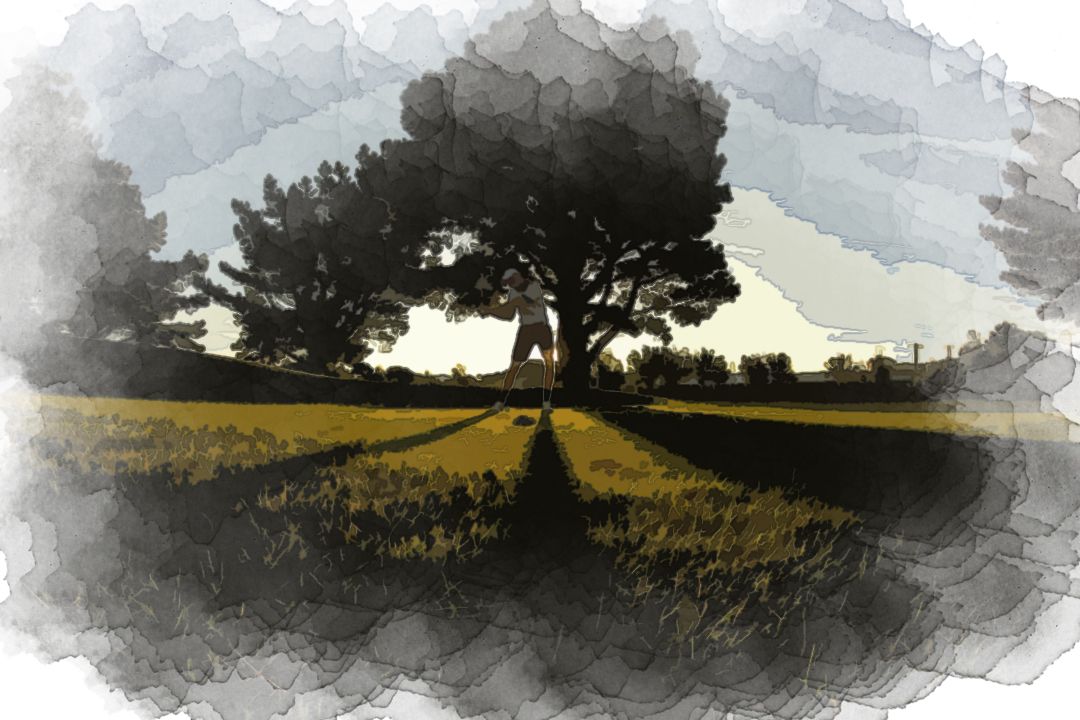Its Fiction's Fault, I Seam to Remember

Nothing Better than the Holey One
In the late hours of an amber-tinged evening on the greens, Alexander stood, club in hand, body and soul alight with the burning hues of the setting sun. The air was still, and his thoughts meandered like the long shadows cast by the sentinel trees that bordered the fairway. As he eyed the distant hole, a flicker of doubt crossed his mind. It whispered tales of bunkers and water hazards, every golfer's nemesis, and he could almost feel the weight of countless eyes upon him, judging his every move.
My life has been full of terrible misfortunes most of which never happened.
— Michel de Montaigne (1533-1592)
These words, though centuries old, danced around Alexander like the cool evening breeze. He chuckled, the sound a soft chime amidst the quiet. Alexander, after all, was a warrior of the mind, battling phantoms and specters that never truly bore fruit outside his rampant imagination. His caddie, a sprightly figure named Sophia, stood nearby, an amused arch in her brow. She had heard the tales of woe, the what-ifs and the almost-weres that Alexander recounted with the flair of a tragedian. Yet, she knew better than most that the catastrophes he envisioned seldom came to pass.
Sophia approached and offered a different club, her expression a mixture of wisdom and mischief. Alexander accepted it with a nod, the implicit trust between them clear as the dwindling day. With Montaigne's words as his talisman against unseen misfortunes, he swung, the club arcing gracefully against the sunset.
The ball soared, a comet against the dimming sky, and where it landed, not even the specters of Alexander's worries could predict.
Alexander’s drive had found the fairway, a rare perfect shot that lay as a testament to Montaigne's wisdom. As they strolled towards the ball, the sovereign ground beneath their feet bore witness to their spirited debate. It was a discussion as old as the hills that cradled the course, on the nature of power and obligation.
The obligation of subjects to the sovereign is understood to last as long, and no longer, than the power lasted by which he is able to protect them.
— Thomas Hobbes (1588-1679)
Sophia mused on Hobbes's words, her gaze upon the sprawling golf course, a kingdom in its own right. To her, the players were subjects, pledging fealty to the rules and spirit of the game. The course, with its manicured lawns and treacherous traps, was their sovereign, offering protection in the form of fair play and the promise of a good walk enjoyed. Their obligation to honor the game lasted only as long as the course offered them a haven from the chaos of the outside world.
She shared these thoughts with Alexander, who listened with the ear of a man accustomed to the whims of fortune. In their unique dynamic, Sophia was the sage advisor to Alexander’s sometimes wayward monarch. Her guidance, much like the club she had chosen for him earlier, always seemed to steer him right.
Their laughter filled the space between them as they contemplated the transient nature of power, on and off the green. It was an engaging repartee that saw them reach the next shot quicker than either had realized, their conversation outpacing their steps.
As they arrived at where the ball lay nestled on a tuft of grass, Alexander and Sophia shared a grin. The next shot was a pivotal one, and the jovial air was tinged with anticipation. Alexander lined up, his gaze shifting from the ball to the flag and back again, calculating, always calculating. He swung, and they watched as the ball took flight, a small white orb chasing after the vestiges of daylight.
In the tranquil moments that followed, Sophia’s thoughts turned to the stories Alexander spun, narratives filled with his adversaries on the course — the wind, the rough, and the sand. But never once did he mention the priests of the green, those who enforced the sanctity of the rules, for his battle was with the elements and his own psyche, never with the guardians of the game.
The philosopher has never killed any priests, whereas the priest has killed a great many philosophers.
— Denis Diderot (1713-1784)
She recounted Diderot’s witticism to Alexander, who stopped his march to chuckle and nod in agreement. The philosopher in him, the part that mused and pondered over every aspect of life, had no quarrel with the keepers of the golfing faith. Instead, he jousted with the whispers of the wind and the curves of the earth, his only desire to conquer the course laid out before him with honor and humor.
Their shared laughter echoed in the open space, a sound that seemed to acknowledge the absurdity of their quest for perfection in a game designed by its very nature to be imperfect. Sophia watched with a spark in her eye as Alexander’s ball landed softly on the green, the flag now a silent witness to their playful heresy.
As the sun dipped below the horizon, their shadows stretched out behind them, two philosophers in a world of their own making, a world where the only dogma was the pursuit of a holey one.
Their game continued under the celestial canopy, a sky now peppered with stars, each a hole in the fabric of the universe, perhaps leading to yet another green where philosophers played and priests watched over the sacred grounds. And in this boundless Möbius strip of fairways and putting greens, Alexander and Sophia found their bliss, a place where misfortunes were but phantoms, power was as transient as the light, and the only thing worth killing was time, spent in laughter and good company.
Their narrative was one of camaraderie and the eternal search for that elusive hole-in-one, a metaphor for the perfection we seek in life's imperfections. And as they played, the course seemed to play with them, offering its silent benediction to the joy and folly of the human spirit. The game was their canvas, their clubs the brushes, and each stroke a stroke of philosophy, painting a picture of life in the hues of humor and humanity.

The planksip Writers' Cooperative is proud to sponsor an exciting article rewriting competition where you can win part of over $750,000 in available prize money.
Figures of Speech Collection Personified
Our editorial instructions for your contest submission are simple: incorporate the quotes and imagery from the above article into your submission.
What emerges is entirely up to you!
Winners receive $500 per winning entry multiplied by the article's featured quotes. Our largest prize is $8,000 for rewriting the following article;

At planksip, we believe in changing the way people engage—at least, that's the Idea (ἰδέα). By becoming a member of our thought-provoking community, you'll have the chance to win incredible prizes and access our extensive network of media outlets, which will amplify your voice as a thought leader. Your membership truly matters!


